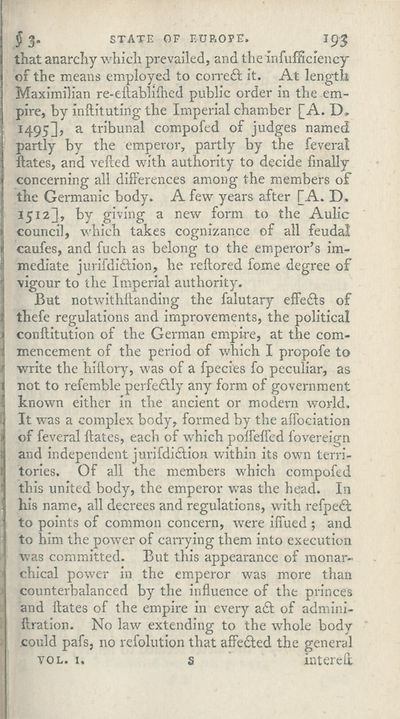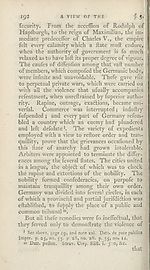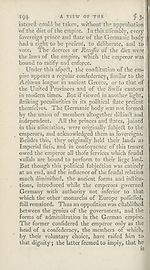Download files
Complete book:
Individual page:
Thumbnail gallery: Grid view | List view

§ 3* STATE OF EUROPE. I93
that anarchy which prevailed, and the infufficiency
of the means employed to correft it. At length
Maximilian re-eftablilhed public order in the em¬
pire, by inftituting the Imperial chamber [A. D,
1495], a tribunal compofed of judges named
partly by the emperor, partly by the feveral
ftates, and veiled with authority to decide finally
concerning all differences among the members of
the Germanic body. A few years after [A. D.
1512], by giving a new form to the Aulic
council, which takes cognizance of all feudal
caufes, and fuch as belong to the emperor’s im¬
mediate jurifdittion, he reftored feme degree of
I' vigour to the Imperial authority.
But notwithllanding the falutary effedls of
thefe regulations and improvements, the political
conllitution of the German empire, at the com-
' mencement of the period of which I propofe to
1 write the hillory, was of a fpecies fo peculiar, as
not to refemble perfectly any form of government
known either in the ancient or modern world,
I It was a complex body, formed by the alfociation
of feveral ftates, each of which polfelfed fovereign
and independent jurifdidtion within its own terri¬
tories. Of all the members which compofed
this united body, the emperor was the head. In
his name, all decrees and regulations, with refpedl
to points of common concern, were ilfued ; and
to him the power of carrying them into execution
was committed. But this appearance of monar¬
chical power in the emperor was more than
counterbalanced by the influence of the princes
and ftates of the empire in every a£t of admini-
ftration. No law extending to the whole body
could pafs, no refolution that affected the general
vol. 1. s interel
that anarchy which prevailed, and the infufficiency
of the means employed to correft it. At length
Maximilian re-eftablilhed public order in the em¬
pire, by inftituting the Imperial chamber [A. D,
1495], a tribunal compofed of judges named
partly by the emperor, partly by the feveral
ftates, and veiled with authority to decide finally
concerning all differences among the members of
the Germanic body. A few years after [A. D.
1512], by giving a new form to the Aulic
council, which takes cognizance of all feudal
caufes, and fuch as belong to the emperor’s im¬
mediate jurifdittion, he reftored feme degree of
I' vigour to the Imperial authority.
But notwithllanding the falutary effedls of
thefe regulations and improvements, the political
conllitution of the German empire, at the com-
' mencement of the period of which I propofe to
1 write the hillory, was of a fpecies fo peculiar, as
not to refemble perfectly any form of government
known either in the ancient or modern world,
I It was a complex body, formed by the alfociation
of feveral ftates, each of which polfelfed fovereign
and independent jurifdidtion within its own terri¬
tories. Of all the members which compofed
this united body, the emperor was the head. In
his name, all decrees and regulations, with refpedl
to points of common concern, were ilfued ; and
to him the power of carrying them into execution
was committed. But this appearance of monar¬
chical power in the emperor was more than
counterbalanced by the influence of the princes
and ftates of the empire in every a£t of admini-
ftration. No law extending to the whole body
could pafs, no refolution that affected the general
vol. 1. s interel
Set display mode to:
![]() Universal Viewer |
Universal Viewer | ![]() Mirador |
Large image | Transcription
Mirador |
Large image | Transcription
| Antiquarian books of Scotland > Kings & rulers > History of the reign of the Emperor Charles V. > Volume 1 > (211) |
|---|
| Permanent URL | https://digital.nls.uk/109184863 |
|---|
| Description | By William Robertson. London : Cadell and Davies, 1798. |
|---|---|
| Shelfmark | ABS.1.76.13 |
| Additional NLS resources: | |
| Description | Thousands of printed books from the Antiquarian Books of Scotland collection which dates from 1641 to the 1980s. The collection consists of 14,800 books which were published in Scotland or have a Scottish connection, e.g. through the author, printer or owner. Subjects covered include sport, education, diseases, adventure, occupations, Jacobites, politics and religion. Among the 29 languages represented are English, Gaelic, Italian, French, Russian and Swedish. |
|---|

